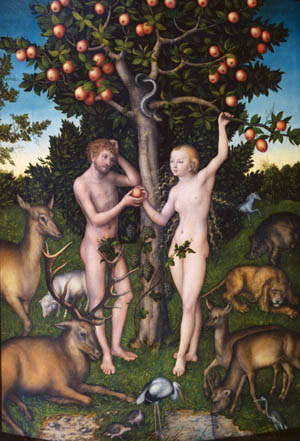Let me start with some throat-clearing. At least one friend and not a few commenters were bothered by the fact that I wrote about my own intuition before I started reflection on the biblical passages at play. One friend told me that, as a self-proclaimed Protestant, I should begin with the Bible, where Protestants always begin.
Firstly, don’t read too much into my decision to write about my intuition first. It has something to do with the fact that I was pressed for time on Monday. Further, I was trying to be a bit autobiographical, in both the introduction and intuition posts. This blog is not particularly a place for forensic arguments, like, say, my dissertation will be. Instead, it’s a place for more personal, impassioned writing.
Secondly, and I’ve been very clear on this point here and elsewhere, I do not think it possible to “begin with the Bible.” We always begin with our own hermeneutical assumptions. Always. No exceptions. A human being cannot escape her/his own hermeneutical horizon. You are encased in it, just as you are encased in your own skin. There’s no escape.
Does this mean that I reject the Lutheran formula of sola scriptura? Well, insofar as sola scriptura is naive to everyone’s interpretive biases, yes. I don’t think I can actually rely on scripture alone. I am always also reliant upon my own reason to interpret and apply scriptural truth (this just in, Tony Jones believes in scriptural truth!). (Just a side question here: Doesn’t sola mean “alone”? As in, all-by-itself-with-nothing-else? How, then, can there be five solas? Is that not logically incoherent?)
So, I might approach the Bible differently than you do. So be it.
Now, on to Genesis!
Let’s begin by looking at what the text really says:
Now, it probably won’t surprise many for me to confess that I don’t think the creation of the cosmos really happened in quite the way it is described in either this creation narrative, or the one preceding it in Genesis 1:1 – 2:3. But my belief that the cosmos is 12-16 billion years old does not mean that I don’t consider the Genesis account true. Quite to the contrary, I do consider it true. (Truth and factuality are not the same.) So, let’s deal with it’s truth.
Adam and Eve are forbidden to eat the fruit of the Tree of Life by God, and bidden to eat it by the serpent. Eve listens to the latter and passes the fruit to her partner. He partakes as well. God discovers their disobedience, and they must pay the consequences.
First, let us note that there are a couple catching phrases in the narrative. One is that the serpent tells Eve that fruit will allow her to know “good and evil,” and Eve decides to eat the fruit, in part, because it was “desirable for gaining wisdom.”
“Then the eyes of both of them were opened,” they became ashames of their nakedness, sewed themselves fig-leaf garments, and thus there choise was discovered by God.
 There are all sorts of interesting interpretive points to be made, but since we’re focusing on the doctrine of Original Sin, let’s focus on the consequences of their actions. Because of their fruity indulgence, A&E become aware and ashamed of their nakedness. And God, in turn, lays the smack down on them: the woman will have pain in childbirth and be subservient to the man; the man will toil to bring food from the earth; they are cast out of the garden; and they will both die.
There are all sorts of interesting interpretive points to be made, but since we’re focusing on the doctrine of Original Sin, let’s focus on the consequences of their actions. Because of their fruity indulgence, A&E become aware and ashamed of their nakedness. And God, in turn, lays the smack down on them: the woman will have pain in childbirth and be subservient to the man; the man will toil to bring food from the earth; they are cast out of the garden; and they will both die.
In the biblical account, this is surely the orginal sin. And I think it’s clear that it is meant to be paradigmatic of the human condition. Given the choice, the passage seems to teach, each of us would choose the fruit that opens our eyes rather than trusting God who tells us we don’t need our eyes opened.
But is this Original Sin? That is, is there anything in the passage that says that A&E might have not chosen to eat the fruit? Or, more to the point of the Western theological notion of Original Sin, that the consequences of their sin has been passed down to every subsequent human via the act of intercourse (thus exempting only Jesus if Nazareth from this inheritence)? Is there something in the passage that would lead us to believe that, as we learned yesterday, this is an “inherited spiritual disease or defect in human nature”?
Based on 1) My own hermeneutical position that this story is truthful in that it is paradigmatic as opposed to factual, and 2) Nothing in the biblical narrative indicates that A&E were changed at the genetic level that would infect subsequent generations, I’ll conclude this: The account of the original sin in Genesis 3 teaches us a lot about the state of human nature, our freedom to know right from wrong, and our proclivity to not necessarily trust God. But it does not teach that the sin of Adam and Eve is responsible for the sins of subsequent generations.
Your thoughts?

